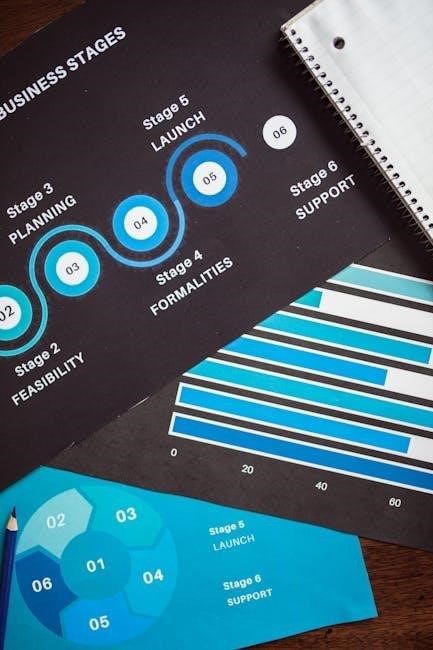Overview of Al-Anon and the Blueprint for Progress
Al-Anon offers support to families and friends affected by someone else’s drinking. The “Blueprint for Progress,” a resource utilized within Al-Anon, facilitates self-reflection. It guides members through a Fourth Step inventory. This inventory helps in personal growth. It encourages exploration of values and relationships.

The Purpose of the Blueprint for Progress
The “Blueprint for Progress” serves as a workbook, guiding Al-Anon members through a crucial self-assessment process. Its primary purpose is to facilitate the Fourth Step inventory, a cornerstone of the Al-Anon program. This inventory encourages individuals to conduct a “searching and fearless moral inventory” of themselves, examining their behaviors, relationships, and personal values. The Blueprint provides thought-provoking questions designed to promote deeper understanding and self-awareness.
Specifically, the Blueprint helps members explore areas such as their fears, resentments, and patterns of control. It also prompts reflection on intimacy, sex, finances, and spirituality, aiding in identifying areas where personal growth is needed. The revised and expanded versions of the Blueprint address these topics in greater detail, offering a more comprehensive framework for self-examination.

By working through the Blueprint, Al-Anon members can gain valuable insights into their own behaviors and how they may be contributing to unhealthy dynamics. The ultimate goal is to empower individuals to make positive changes, improve their relationships, and find peace of mind amidst the challenges of living with alcoholism. It is a tool for progress.

Fourth Step Inventory in Al-Anon
The Fourth Step Inventory holds a central position within the Al-Anon program, representing a deep dive into self-reflection and personal accountability. It is a process where members honestly examine their past actions, behaviors, and relationships to identify patterns and areas for growth. The core objective is not to dwell on blame or guilt but to foster self-awareness and promote positive change.
The “Blueprint for Progress” serves as a valuable tool in navigating this inventory. It provides a structured framework and thought-provoking questions to guide members through the process. This workbook assists in exploring various aspects of one’s life, including relationships, values, and self-perception. By answering these questions and reflecting on their experiences, individuals can gain a clearer understanding of their strengths, weaknesses, and the impact of their actions on others.

The Fourth Step Inventory is not a one-time event but rather an ongoing process of self-discovery. It encourages members to regularly assess their progress, identify new challenges, and continue striving towards personal growth and well-being within the Al-Anon program.

Key Topics Covered in the Revised Blueprint
The revised “Blueprint for Progress” expands on previous editions. It includes new sections addressing critical areas. These areas are fear, anger, and control. Furthermore, it delves into intimacy, sex, and finances. Spirituality is also explored, offering a comprehensive guide.
Fear
Within the “Blueprint for Progress,” the exploration of fear takes center stage, acknowledging its profound impact on individuals navigating the complexities of living with alcoholism. The workbook prompts users to delve into the various manifestations of fear in their lives, encouraging them to identify specific triggers and underlying anxieties. It helps individuals examine how fear influences their decisions, relationships, and overall well-being.
The Blueprint guides members to understand fear not as an insurmountable obstacle but as an emotion that can be understood and managed. It encourages self-reflection on the roots of fear, tracing them back to past experiences and traumas. By acknowledging the origins of their fears, individuals can begin to develop coping mechanisms.
The workbook’s exercises encourage users to challenge irrational fears and develop a more realistic perspective. Furthermore, it emphasizes the importance of self-compassion and acceptance. The “Blueprint for Progress” encourages individuals to confront their fears head-on, empowering them to reclaim control over their lives. It also provides tools for building resilience and fostering a sense of inner peace. Through these exercises, individuals can transform fear from a paralyzing force into a catalyst for growth. Ultimately, this empowers them to live more authentically and freely.

Anger
The “Blueprint for Progress” dedicates a section to examining anger, recognizing it as a common emotion experienced by those affected by alcoholism. The workbook encourages individuals to explore the sources of their anger, prompting them to identify specific situations, behaviors, or beliefs that trigger feelings of resentment, frustration, or rage. It guides users in understanding the difference between healthy and unhealthy expressions of anger, emphasizing the importance of expressing emotions constructively.
The Blueprint helps individuals recognize how anger can manifest in destructive ways, such as through verbal abuse, passive-aggressive behavior, or self-destructive habits. It provides tools for managing anger in healthy ways, such as through deep breathing exercises, journaling, or seeking support from others. The workbook also encourages individuals to explore the underlying causes of their anger, which may include feelings of powerlessness, betrayal, or abandonment.
The “Blueprint for Progress” promotes self-awareness, helping individuals identify their anger triggers and develop strategies for coping with them effectively. It encourages users to practice empathy and compassion, both for themselves and for others. By working through the exercises in the Blueprint, individuals can learn to transform their anger into a catalyst for positive change, fostering healthier relationships and improving their overall well-being. It helps build emotional resilience.
Control
Within the framework of Al-Anon and the “Blueprint for Progress,” the concept of control is addressed with sensitivity and insight. Recognizing that family members of alcoholics often struggle with attempts to control the alcoholic’s behavior, the workbook encourages a shift in focus toward what is controllable: one’s own actions, reactions, and attitudes. The “Blueprint” gently guides individuals to examine their controlling behaviors, exploring the motivations behind them. Are they rooted in fear, anxiety, or a genuine desire to help?
The workbook prompts users to identify specific instances where they have tried to control the alcoholic or the situation, and to assess the effectiveness of those attempts; It emphasizes that while it’s natural to want to protect loved ones, attempts to control another person’s choices are often futile and can lead to increased stress and resentment. The “Blueprint” introduces the idea of detachment with love, a concept that involves setting healthy boundaries and allowing the alcoholic to experience the consequences of their actions.
It encourages individuals to relinquish the illusion of control, finding peace and serenity in accepting what they cannot change. The workbook offers practical exercises for letting go of control, such as practicing mindfulness, focusing on self-care, and seeking support from other Al-Anon members. Ultimately, the “Blueprint for Progress” aims to empower individuals to reclaim their lives by focusing on their own well-being rather than trying to manage the behavior of others, fostering healthier relationships.

Intimacy, Sex, and Finances
The “Blueprint for Progress” acknowledges that alcoholism can profoundly impact intimacy, sex, and finances within a family. It dedicates sections to exploring these sensitive areas, providing a safe space for reflection. Regarding intimacy, the workbook encourages individuals to examine how alcoholism has affected their emotional and physical closeness with their partner. Has trust been eroded? Are there feelings of resentment or anger that are hindering connection?
The “Blueprint” also addresses the impact of alcoholism on sexual relationships. It acknowledges that addiction can lead to decreased libido, infidelity, or a general sense of disconnection. It prompts individuals to consider whether their sexual needs are being met and to identify any underlying issues that may be contributing to problems in this area.
Finances, another key area, often suffer due to the costs associated with addiction, such as alcohol purchases, legal fees, or job loss. The workbook encourages individuals to assess the financial impact of alcoholism on their household and to develop strategies for managing their resources effectively. It emphasizes the importance of financial independence and encourages individuals to seek professional help if needed.
By addressing these sensitive topics, the “Blueprint for Progress” empowers individuals to confront the challenges they face and to begin the process of healing and recovery. It encourages open and honest communication within the family and provides tools for rebuilding trust and creating a more stable and fulfilling life.

Availability and Format of the Blueprint
The “Blueprint for Progress: 4th Step Inventory (Revised)” is available through Al-Anon Family Group Headquarters, Inc. and potentially through local Al-Anon groups. It may be purchased directly from their online store or by contacting them via phone or mail. Availability might vary depending on the region and current stock. Some groups may also offer it as part of their meeting resources. Checking the Al-Anon website is recommended.
The “Blueprint” is designed as a workbook, facilitating personal reflection and written responses. The revised edition (P-91) expands upon the original P-5 version, including sections on fear, anger, control, intimacy, sex, finances, and spirituality.
The physical format is spiral-bound, allowing it to lay flat for ease of writing. It’s approximately 8 x 11 inches in size, providing ample space for answers. It’s also three-hole punched, making it convenient to insert into a binder or notebook for organization. The workbook consists of 96 pages, filled with thought-provoking questions and prompts designed to guide individuals through their Fourth Step inventory.
The “Blueprint” is primarily available in English, catering to the organization’s main language base. However, Al-Anon provides many resources in other languages like Spanish and French. It’s advisable to check Al-Anon’s website.




